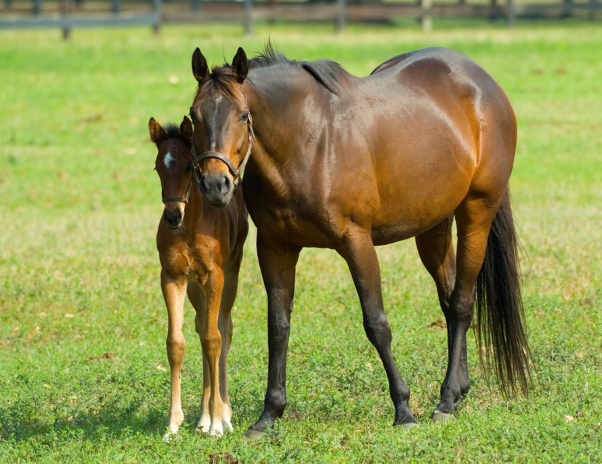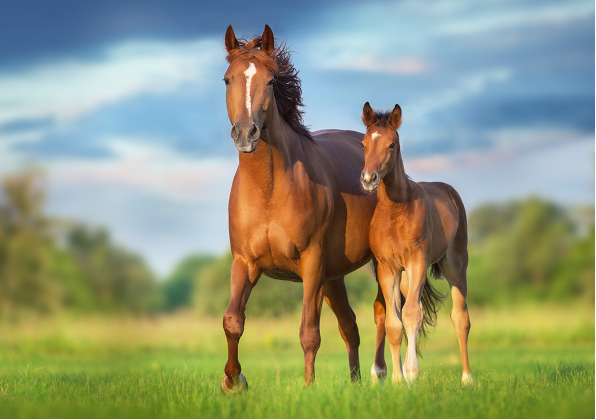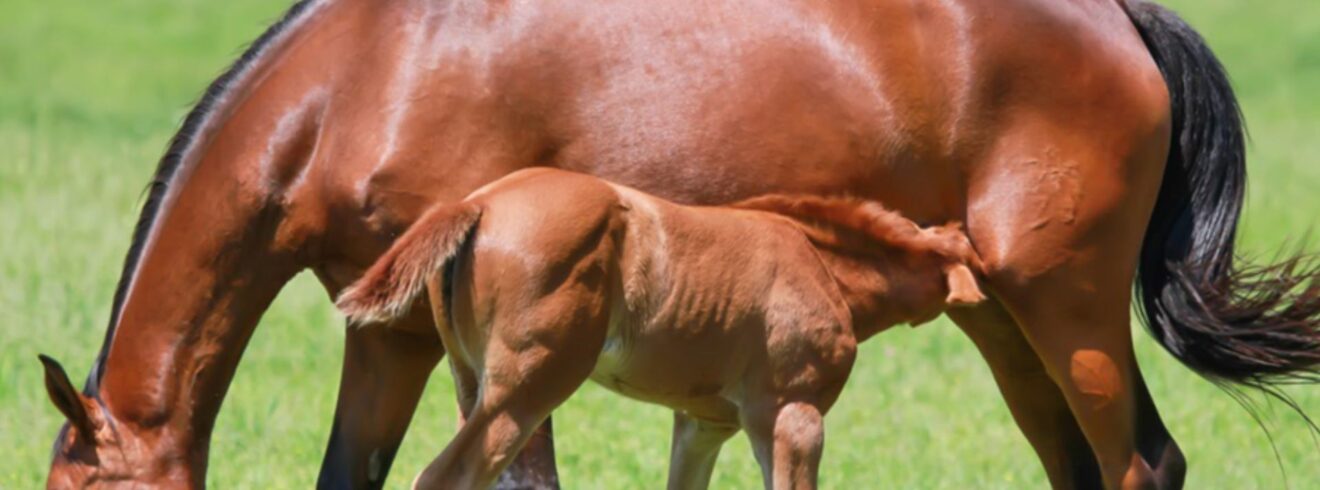How important is nutrition in the stages of late pregnancy?
Good nutrition is vital during a mare’s pregnancy and lactation. It will ensure the best welfare for both the mare and the developing foal, it will maximise the return on investment and will speed up the return to the breeding shed.
Nutrition of the mare throughout her pregnancy is critical to ensure optimal skeletal development of the foal and quality colostrum production. Although the foetus only gains about 35% of its foaling weight in the first 7 months of pregnancy, a well-balanced diet will provide nutrients that can improve the health of the foal and ensure normal development.
Early pregnancy will often coincide with the availability of energy rich grass; excessive weight gain in early gestation is undesirable therefore, control grazing where necessary. Some ways to control access to pasture are:
- Stocking rates,
- Strip grazing,
- Mixed grazing
- Using a grazing muzzle
Another result of the ‘artificial’ breeding season is that thoroughbred mares are often heavily pregnant in winter months, foaling when pasture quality is poor and temperatures are low. At the same time, broodmares are getting heavier as they approach foaling and they may become more sedentary.
In late pregnancy (the last 3 months of gestation), the foetus begins to develop rapidly. Digestible energy requirements increase only by about 15% at this time, however, protein and mineral requirements increase largely since the foetal tissue being produced is quite high in protein, calcium and phosphorus.
Trace mineral supplementation is also very important during this period because the foetus stores iron, zinc, copper and manganese in its liver for use during the first few months after it is born. Feeds that contain Bioplex® or protected trace minerals will deliver these nutrients more effectively versus those containing only inorganic minerals.
GAIN Stud Cubes and GAIN Stud Mix contain a comprehensive specification of all the nutrients required during late pregnancy with a particular focus on the quality of the vitamin and mineral content.
Mares in late pregnancy are often overfed in an attempt to supply adequate protein and minerals to the developing foal. If the pregnant mare becomes fat during late pregnancy (later foaling mares are most susceptible particularly in areas where grass has become plentiful in spring months), she should be switched to a feed that is more concentrated in protein and minerals e.g. GAIN StudCare 32 Balancer. This will restrict her energy intake while ensuring that she receives adequate quantities of other key nutrients.

What should I feed a barren mare?
Barren mares in particular will benefit from being fed prior to conception and then through pregnancy on GAIN Stud Cubes, GAIN Stud Mix or GAIN StudCare 32 Balancer, all of which provide essential micronutrients and quality amino acids during the early and later developmental stages of pregnancy.
The importance of vitamin E
Vitamin E is vital for broodmares during pregnancy. Broodmares that have little access to green grass or good quality hay/haylage are at risk of a reduced vitamin E intake. GAIN Stud products contain high levels of vitamin E and Proviox® a natural plant antioxidant. This should result in desirable blood levels of vitamin E that have been shown to have improved immune responses to vaccination and increased immunoglobulin IgG in the milk.
After foaling, the mare’s milk is the main source of nutrients for the growing foal and her nutrient requirements increase significantly during lactation. It is essential that newborn foals receive adequate quantity and quality of colostrum in the first 24 hours of life to provide them with immunity from microbial challenges in their environment.
During the first three months of lactation, mares produce milk at a rate equal to about 3% of their body weight per day. This milk is rich in energy, protein, calcium, phosphorus and vitamins. If the mare does not receive adequate nutrition during this period, she may dip into her own body reserves and lose condition.

Rebreeding may then be problematic. Therefore, the mare should be fed appropriate concentrate such as GAIN Stud Cubes or GAIN Stud Mix in conjunction with good quality forage to meet these increased requirements. Later foaling mares or those foaling at a time of peak grass growth may be fed a high specification; low calorie feed balancer such as GAIN StudCare 32 Balancer.
Keeping regular checks on your mares’ body condition score throughout her breeding and lactating cycle will help you to manage your feeding programme, if at any stage you are concerned it is best to contact a feed specialist or nutritionist.
Joanne Hurley is a nutrition specialist with GAIN Equine Nutrition. She holds a Masters in Animal Nutrition and Production from UCD. Joanne can be contacted by email at jhurley@tirlan.ie

